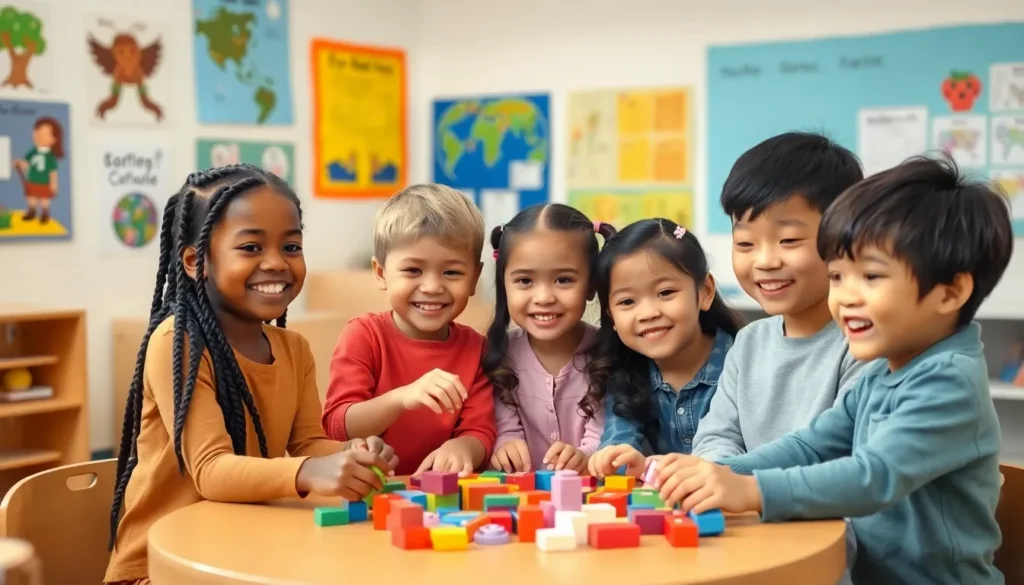Table of Contents
ToggleIn today’s increasingly interconnected world, preschool diversity plays a crucial role in shaping young minds. Early childhood education isn’t just about learning letters and numbers; it’s also about fostering an appreciation for different cultures, backgrounds, and perspectives. By embracing diversity in preschool settings, educators help children develop empathy and social skills that will benefit them throughout their lives.
Creating a diverse preschool environment enriches the learning experience for all children. Exposure to various cultures and traditions encourages curiosity and acceptance, laying the groundwork for inclusive communities. As parents and educators recognize the importance of diversity in early education, they set the stage for a brighter, more harmonious future where every child feels valued and understood.
Understanding Preschool Diversity
Preschool diversity encompasses various aspects, including ethnic backgrounds, cultures, languages, and abilities present within a classroom. Embracing this diversity benefits children’s learning experiences and promotes mutual respect and understanding.
Defining Preschool Diversity
Preschool diversity refers to the range of differences among children in a preschool setting. It includes variations in race, ethnicity, socioeconomic status, language, family structure, and developmental abilities. By recognizing this diversity, educators create an inclusive environment that celebrates each child’s unique identity.
Importance of Preschool Diversity
Preschool diversity plays a crucial role in early childhood education.
- Promotes Empathy: Exposure to different backgrounds helps children develop empathy and understanding.
- Enhances Social Skills: Diverse interactions facilitate better communication and cooperation among peers.
- Fosters Acceptance: Children learn to appreciate differences, leading to acceptance of varying perspectives.
- Builds Critical Thinking: Engaging with diverse viewpoints encourages critical thinking and problem-solving skills.
- Encourages Cultural Awareness: Understanding diverse cultures enriches children’s knowledge and appreciation of the world around them.
These factors contribute to a well-rounded education, preparing children for a more harmonious and inclusive society.
Benefits of Preschool Diversity

Preschool diversity offers numerous advantages that contribute to children’s overall development. It fosters cognitive growth and enhances social skills, both essential for success in later stages of life.
Cognitive Development
Diverse experiences in preschool stimulate cognitive development. Exposure to various cultures, languages, and traditions encourages critical thinking and problem-solving skills. For instance, children learn to approach challenges from multiple perspectives, enhancing their ability to innovate. Learning alongside peers from different backgrounds promotes curiosity, leading to deeper engagement with educational materials. A stimulating environment boosts creativity, as children draw inspiration from their diverse surroundings. Research shows that children in diverse preschools often perform better academically as they develop a broader understanding of complex concepts.
Social Skills Enhancement
Diverse preschools significantly enhance social skills among children. Interaction with peers from various backgrounds fosters empathy and acceptance, allowing children to navigate social settings effectively. For example, engaging with classmates who speak different languages encourages communication and teamwork. Children learn to appreciate differences, preparing them for diverse workplaces in the future. Additionally, inclusive environments build confidence, enabling children to express themselves and form meaningful connections. Studies indicate that early exposure to diverse groups leads to stronger interpersonal skills, making children more adaptable and socially aware individuals.
Challenges in Promoting Preschool Diversity
Promoting preschool diversity faces significant challenges that hinder its effective implementation. These issues often originate from cultural barriers and resource limitations.
Cultural Barriers
Cultural barriers often impede the celebration of diversity in preschool settings. Some families may hold onto stereotypes or misconceptions about other cultures, which can affect their interactions with educators and peers. Communication obstacles arise due to language differences, leading to misunderstandings between families and staff. Additionally, limited representation of diverse cultures in curriculum materials can result in children feeling disconnected from their own backgrounds. This lack of inclusivity can hinder the development of empathy and cultural competence, essential skills needed in today’s interconnected world.
Resource Limitations
Resource limitations significantly affect efforts to promote preschool diversity. Many preschools operate with constrained budgets, limiting their ability to acquire diverse educational materials and training resources. Lack of funding often restricts educators from accessing workshops and professional development opportunities focused on diversity and inclusion. Additionally, insufficient staffing can lead to a lack of individualized attention for children from diverse backgrounds. Ultimately, financial constraints impact the overall quality of programs, making it challenging to create an inclusive and enriching environment for all children.
Strategies for Enhancing Preschool Diversity
Implementing effective strategies enhances preschool diversity and creates a more inclusive environment. Focusing on curriculum development and community engagement proves beneficial for fostering diversity in early education.
Curriculum Development
Curriculum development plays a crucial role in promoting preschool diversity. Educators can include multicultural themes and materials that represent various ethnic backgrounds, cultures, and traditions. Materials such as books, artwork, and music from different cultures provide children with exposure to diverse viewpoints. Activities like storytelling, celebration of international holidays, and culinary experiences allow children to engage with different cultures firsthand.
Incorporating languages spoken within the community enriches the curriculum further. Introducing basic vocabulary and phrases creates respect and recognition for non-English speaking students. Adapting lesson plans to reflect children’s unique backgrounds enables them to see themselves in educational content, fostering a sense of belonging.
Community Engagement
Community engagement strengthens preschool diversity by building partnerships between preschools and local families. Inviting parents and community members to participate in classroom activities fosters cultural sharing. Events like family potlucks or cultural fairs encourage families to showcase their heritage, leading to mutual respect and understanding among children and families.
Establishing collaborations with local organizations that specialize in diversity can provide additional support and resources. Workshops and training sessions for educators on culturally responsive teaching methods promote inclusive practices. Actively seeking diverse role models from the community to speak to children and share their experiences creates inspiration and aspiration among young learners.
By prioritizing curriculum development and community engagement, preschools can enhance their diversity strategies, ensuring that every child feels valued and included.
Embracing preschool diversity isn’t just beneficial; it’s essential for fostering a generation that values inclusion and empathy. By cultivating an environment rich in cultural experiences and perspectives, preschools can significantly enhance children’s social and cognitive development. The strategies outlined for promoting diversity not only prepare children for future challenges but also create a sense of belonging that enriches their early learning experience.
As communities work together to support diverse preschools, they pave the way for a more harmonious society where every child feels valued and understood. Prioritizing diversity in early education lays the foundation for a brighter, more inclusive future.





